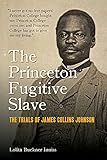The Princeton Fugitive Slave : The Trials of James Collins Johnson / Lolita Buckner Inniss.
Material type: TextPublisher: New York, NY : Fordham University Press, [2019]Copyright date: ©2019Description: 1 online resource (272 p.) : 14Content type:
TextPublisher: New York, NY : Fordham University Press, [2019]Copyright date: ©2019Description: 1 online resource (272 p.) : 14Content type: - 9780823285365
- African Americans -- Legal status, laws, etc -- New Jersey -- History
- African Americans -- New Jersey -- Biography
- Fugitive slaves -- Legal status, laws, etc -- New Jersey
- Slavery -- New Jersey -- History
- SOCIAL SCIENCE / Slavery
- Mid-Atlantic
- Nassau Hall
- New Jersey
- Princeton University
- fugitive slave
- slavery
- trial
- universities
- 306.3/6209749 23
- online - DeGruyter
| Item type | Current library | Call number | URL | Status | Notes | Barcode | |
|---|---|---|---|---|---|---|---|
 eBook
eBook
|
Biblioteca "Angelicum" Pont. Univ. S.Tommaso d'Aquino Nuvola online | online - DeGruyter (Browse shelf(Opens below)) | Online access | Not for loan (Accesso limitato) | Accesso per gli utenti autorizzati / Access for authorized users | (dgr)9780823285365 |
Browsing Biblioteca "Angelicum" Pont. Univ. S.Tommaso d'Aquino shelves, Shelving location: Nuvola online Close shelf browser (Hides shelf browser)

|

|

|

|

|

|

|
||
| online - DeGruyter Karl Barth and Comparative Theology / | online - DeGruyter Dynamis of Healing : Patristic Theology and the Psyche / | online - DeGruyter America's Most Famous Catholic (According to Himself) : Stephen Colbert and American Religion in the Twenty-First Century / | online - DeGruyter The Princeton Fugitive Slave : The Trials of James Collins Johnson / | online - DeGruyter Humbug! : The Politics of Art Criticism in New York City's Penny Press / | online - DeGruyter Upper West Side Catholics : Liberal Catholicism in a Conservative Archdiocese / | online - DeGruyter In Praise of Risk / |
Frontmatter -- Contents -- Preface -- Timeline -- Introduction -- 1 James Collins of Maryland, and His Escape from Slavery -- 2 Princeton Slavery, Princeton Freedom -- 3 The Betrayal and Arrest of James Collins Johnson -- 4 The Fugitive Slave Trial of James Collins Johnson -- 5 The Rescue of James Collins Johnson -- 6 Johnson's Princeton Life after the Trial -- Conclusion -- Acknowledgments -- Notes -- Bibliography -- Index
restricted access online access with authorization star
http://purl.org/coar/access_right/c_16ec
James Collins Johnson made his name by escaping slavery in Maryland and fleeing to Princeton, New Jersey, where he built a life in a bustling community of African Americans working at what is now Princeton University. After only four years, he was recognized by a student from Maryland, arrested, and subjected to a trial for extradition under the 1793 Fugitive Slave Act. On the eve of his rendition, after attempts to free Johnson by force had failed, a local aristocratic white woman purchased Johnson's freedom, allowing him to avoid re-enslavement. The Princeton Fugitive Slave reconstructs James Collins Johnson's life, from birth and enslaved life in Maryland to his daring escape, sensational trial for re-enslavement, and last-minute change of fortune, and through to the end of his life in Princeton, where he remained a figure of local fascination.Stories of Johnson's life in Princeton often describe him as a contented, jovial soul, beloved on campus and memorialized on his gravestone as "The Students Friend." But these familiar accounts come from student writings and sentimental recollections in alumni reports-stories from elite, predominantly white, often southern sources whose relationships with Johnson were hopelessly distorted by differences in race and social standing. In interrogating these stories against archival records, newspaper accounts, courtroom narratives, photographs, and family histories, author Lolita Buckner Inniss builds a picture of Johnson on his own terms, piecing together the sparse evidence and disaggregating him from the other black vendors with whom he was sometimes confused.By telling Johnson's story and examining the relationship between antebellum Princeton's black residents and the economic engine that supported their community, the book questions the distinction between employment and servitude that shrinks and threatens to disappear when an individual's freedom is circumscribed by immobility, lack of opportunity, and contingency on local interpretations of a hotly contested body of law.
Mode of access: Internet via World Wide Web.
In English.
Description based on online resource; title from PDF title page (publisher's Web site, viewed 02. Mrz 2022)


